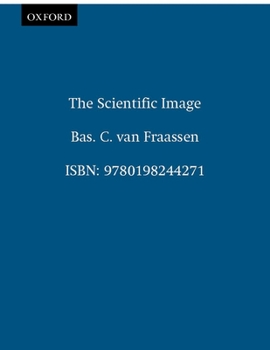The Scientific Image
Select Format
Select Condition 
Book Overview
In this book van Fraassen develops an alternative to scientific realism by constructing and evaluating three mutually reinforcing theories.
Format:Paperback
Language:English
ISBN:0198244274
ISBN13:9780198244271
Release Date:October 1980
Publisher:Clarendon Press
Length:248 Pages
Weight:1.39 lbs.
Dimensions:0.6" x 5.5" x 8.5"
Customer Reviews
4 ratings
Wonderfully important book
Published by Thriftbooks.com User , 22 years ago
This is a must read for anyone wishing to sincerely engage in philosophy of science. It should change the way you think about science, but it does not deny anything essential to science. Just so you know, Van Fraassen is a Catholic, so he does seem to believe in unobservable entities, though he denies that empirical science as it is commonly understood can tell us anything about them directly.
A book on very contemporary philosophy of science
Published by Thriftbooks.com User , 26 years ago
In this book, van Fraassen put forth a 'constructive empiricist' anti-realist account of science. The book contains many metaphors and even a short story. Yet it is often unclear whether he is prescribing norms for scientists, and merely describing their practice. (This may result from his counterfactual account, which strangely seems to warrant belief in propositions containing terms allegedly referring to unobservables that have nevertheless not been observed. At best, the account makes perfect agnosticism preferable to belief-formation with respect to propositions containing unobservable terms, where such prescriptions are justified on the basis of something other than facts.) The book represents what positivist philosophy might have become in the absence of thinkers who were more sensitive to the subtleties between the philosophy of language and ontology.
van fraassen's endorsement of unobservable entities
Published by Thriftbooks.com User , 27 years ago
bas van fraassen in claiming to offer a viable alternativve to scientific realism has indirectly acknowledged the existence of unobservable entities in saying that we will nnot know eveything there is to know or everything thaat can be known in the universe/life.As an empiricist or form of it he generously engages the dicourse that unobservable entities DO have meaning but that they cant exist because any such admission would be a saving of realist theory(scientific realism posits the view that these objects have not only existence but meaning too).scientific realism is optimistic in that it belives that everything can be known or discovered by advocating this view of science,but vF rejcts this but by doing so he has created an entity that will remain forever unknowable to the mind,an unobsevable entity technically if nothing else he creates their existence and this is contrary to his position. paul neilan an NUIG student.
An attack on then and still fashionable scientific realism.
Published by Thriftbooks.com User , 28 years ago
Bas van Fraassen rejects the current trend in philosophy of science toward scientific realism. In this book, he advocates something he calls constructive empiricism as an alternative; his constructive empiricism has a neo-positivist feel to it, but the development of his own position is not the most interesting aspect of this book. His criticisms of scientific realism, which really form the heart of the work, are extremely detailed, forceful, and interesting; they present a challenge which, after a decade and a half, scientific realists have yet to meet.





